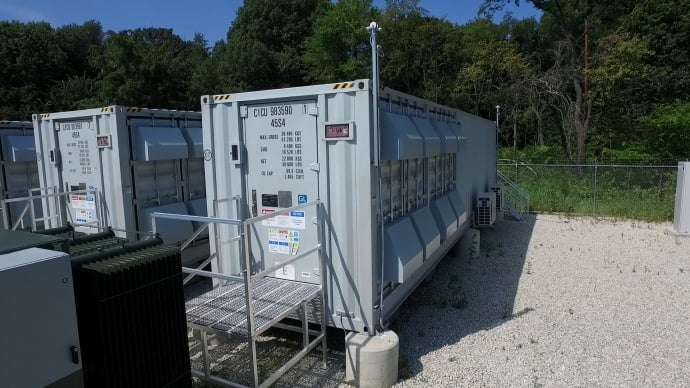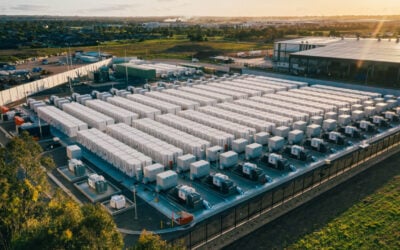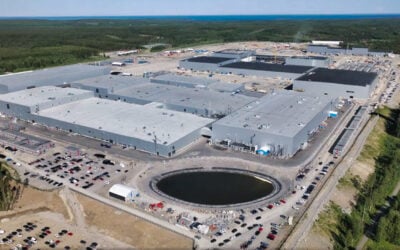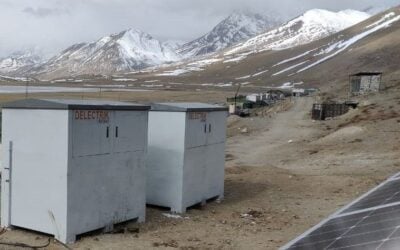
A collaboration between the innovation arm of fossil fuel company Shell and the US National Renewable Energy Laboratory (NREL) selected the maker of an organic flow battery among a group of “startups with the potential to dramatically alter the future global energy landscape”.
Adam Duran, programme director at Shell GameChanger Accelerator Powered by NREL (styled as CGxN), spoke with Energy-Storage.news about the selection of Jolt Energy Storage as one of three startups selected to receive technical and capital resource assistance to accelerate commercialisation of their products, and de-risking investment somewhat.
Duran said the three companies, the third tranche of selected cohorts, “represents startups that are increasing efficiency of solar and energy storage technologies and standardising manufacturing processes at a lower cost than available solutions,” with the overall accelerator programme focusing on “accelerating the commercialisation of disruptive, novel technologies”.
Beechwood, Michigan-headquartered Jolt makes flow batteries “with the same large-scale storage capabilities as lithium-ion, but at a lower cost,” a press release sent out by GCxN said. The devices use organic compounds for electrolytes and claim an energy density around four times that of vanadium redox flow batteries.
Try Premium for just $1
- Full premium access for the first month at only $1
- Converts to an annual rate after 30 days unless cancelled
- Cancel anytime during the trial period
Premium Benefits
- Expert industry analysis and interviews
- Digital access to PV Tech Power journal
- Exclusive event discounts
Or get the full Premium subscription right away
Or continue reading this article for free
Selected alongside Jolt and its redox flow energy storage batteries were BluDot Photonics, which is attempting to create cost-effective and scalable solar cells using perovskite and Icarus RT, which is making a hybrid solar-thermal photovoltaic system that recycles “waste heat” from solar panels.
“As renewables adoption increases over time, the need for large-scale energy storage technologies will continue to grow,” NREL staffer Duran said, in explaining Jolt Energy’s selection.
“Lithium ion batteries are the current industry standard, but the materials and chemicals involved are expensive, can degrade fairly quickly, and are difficult to recycle. Therefore, it is important to explore alternative solutions. Jolt Energy Storage uses organic compounds to develop safer and more efficient flow batteries with the same large-scale storage capabilities as lithium-ion, but at a lower cost. Jolt Energy uses carbon-based liquids in their flow batteries in place of other more expensive substances.”
Although Jolt’s claimed energy density is less than half that of lithium-ion’s benchmarked 250Wh/kg, at “approximately 80-100Wh/kg” (citing vanadium redox flow batteries remain at 25Wh/kg), the company claims its redox flow battery is low environmental impact by comparison with both ‘rival’ technologies. Jolt also said its flow batteries have an expected service lifetime of 20 years, similar to VRFB, while lithium-ion typically has a 10-year expected service life. Within the flow battery space, vanadium is also not the only game in town, with providers exploring a number of other options for what to put in their electrolyte tanks, as explored a while back in this feature article which profiles four different flow battery providers.
The GCxN programme, which is funded by Shell Gamechanger and administered by NREL, pays out up to US$250,000 in non-dilutive funding to companies which successfully come through a selection process of being nominated by a network of channel partners including more than 60 universities, incubators, and accelerators in clean energy and tech.
Adam Duran said that NREL and Shell Gamechanger then make a “rigorous, in-depth review” of the nominated companies. Ultimately, once they have made it that far, “all selected startups have the potential to dramatically alter the future global energy landscape, but need technical and funding support to overcome barriers to market,” Duran said.
Solar Media’s new Digital Summits series has been launched to provide critical market insights, intelligence and networking opportunities to maintain our industries’ momentum. Running throughout May and June, the Digital Summits will deliver the full live event experience to your own home. The Energy Storage Digital events include a strand on Beyond Lithium – advancing technologies for energy storage.
Energy Storage Digital Series: 11-15 May. See here for more information on how to take part.





